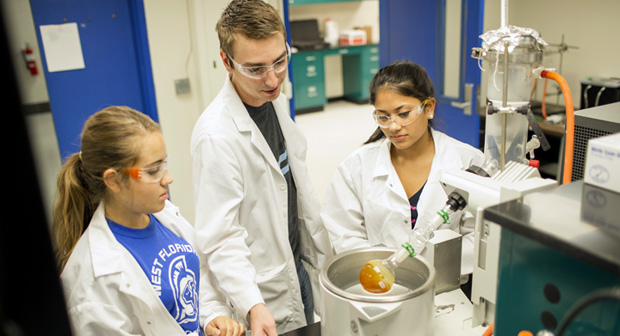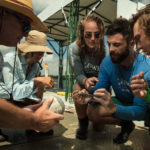New undergraduate research program awards $149,900 to UWF students
The University of West Florida’s College of Science, Engineering and Health has launched its first annual Summer Undergraduate Research Program (SURP). The 10-week experience, funded almost entirely by external gifts and grants, was established to provide students with hands-on learning experiences that extend beyond the lecture hall. The program allows undergraduate students an opportunity to spend the summer working in their field of study to gain additional skills and knowledge.

“Sitting in the classroom really doesn’t give STEM and health students everything they need to be competitive in today’s workforce,” said Dr. Michael Huggins, dean of the College of Science, Engineering and Health. “In a research environment, they are able to take their classroom knowledge and apply it to specific problems.”
To be considered for the program, students submitted formal applications, including a research project proposal and statement of personal and professional objectives. The 54 students selected will be paid to work 20 to 25 hour per week in a UWF research lab with a faculty mentor.
Research projects are clustered into the following subject areas – Coastal and Marine Studies, Cybersecurity, Data Science and Informatics, Energy, Health and Wellness and Molecular and Material Science.
Biology student Nicholas Zielinski said he applied for the SURP because he knew it would allow him to gain valuable experience in his field of study.
“The program will extend the knowledge I need to continue my education in graduate school and find a job as a marine biologist,” Zielinski said. “I hope to complete the program having learned valuable skills concerning molecular biology and the analysis of genetic variation. I also hope the SURP will increase my chances of getting into the graduate school of my choice.”
Private donations in the amount of $107,500 will support the 43 research students. The remaining 11 projects will be funded by internal and external research grants totaling $42,400.
Just as the students have an opportunity to distinguish themselves from their peers by participating in the immersive summer program, the concept itself sets UWF apart from other universities.
“Many universities allow undergraduates to participate in research,” Huggins said. “But I’m aware of only a few that have a formalized program offering paid research experiences to undergraduate students in 10 academic departments and 2 research centers, particularly where the students are supported mostly by donor money.”
The SURP will end Aug. 7, 2015 with a summer research celebration, during which students will present the results of their projects.


